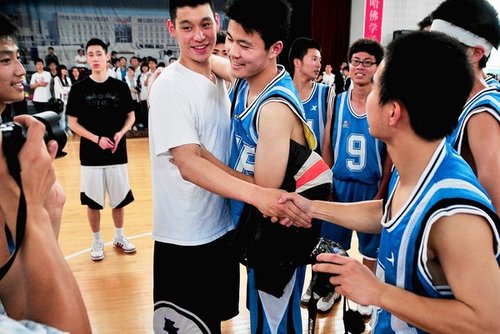Reuters
Feb 27, 2012
Trademark dispute looming over who discovered Jeremy Lin
Reuters
Feb 27, 2012
BEIJING, Feb 27 (Reuters) - The New York Knicks may have given Jeremy Lin his break in the NBA, but a sports ball maker in eastern China saw potential in the Harvard-educated Chinese-American more than a year and a half ago -- and quietly registered his trademark for $700.
 U.S. basketball player Jeremy Lin, in T-shirt, shakes hands after a match last year at a school in Pinghu, his family's ancestral home in China's Zhejiang province. (AFP/Getty Images) |
The issue is the latest in a series of China trademark troubles for Western sports stars and companies that have ensnared American icons ranging from basketball star Michael Jordan to Apple's iPad in recent disputes.
Registering is cheap and relatively easy, and since Chinese law favours those who register trademarks first, squabbles over them can prove thorny to unravel, legal experts said.
Lin, 23, the son of Taiwanese immigrants who had been cut by two National Basketball Association teams before getting his chance with the Knicks, rocketed from obscurity to worldwide celebrity this season, coming off the bench to spark a team that had been forced to play without its top players.
But before Lin got hot, in July 2010, Wuxi Risheng Sports Utility Co, which makes about one million basketballs, volleyballs and soccer balls a year, registered his name as a trademark.
The company applied to trademark a variation of Lin's name, "Lin Shuhao (in Chinese characters) Jeremy S.H.L. (initials of Lin's Chinese name)", according to the website of the trademark office of China's State Administration of Industry and Commerce.
The application was approved in August, with the company paying just 4,460 yuan ($710) for the rights and creating a headache for Lin and his corporate partner Nike, with which he signed a three-year contract in 2010.
Nike and Lin could not be reached for immediate comment.
China's relatively relaxed trademark policies could prove costly for Lin, whose $800,000 salary this season is modest by NBA standards. Forbes SportsMoney said on its online edition that he is worth $15 million.
"In China, first-to-register gets the rights. You may have an idea, and you can register its trademark without ever using it. Unlike in the U.S., where one must first show actual use or an intention to use before one can apply for a trademark," Horace Lam, Beijing-based intellectual property partner of global law firm Jones Day, said in an interview.
"This trademark will be difficult to take from Risheng because Risheng applied for these trademarks ... for use in the same products that Nike sells: a wide array of athletic apparel and sports equipment.
"Nike and Jeremy Lin could buy the trademark from Risheng, which could potentially cost millions of RMB," Lam said.
Nike Inc started selling Jeremy Lin-themed shoes on its website and launched its "Linsanity" line of clothes at Foot Locker Inc stores this month, cashing in on the point guard's fame.
Lin himself is applying for a trademark in the United States to the term "Linsanity", widely used to describe his meteoric rise, according to the U.S. Patent and Trademark Office.
EYE FOR TALENT
Risheng's legal representative, Yu Minjie, said Lin caught her eye when she saw him playing on Chinese television in 2010.
"I'm a Harvard fan ... I like him very much. He gave me a lot of surprises and inspiration," Yu told Reuters.
Risheng will start selling basketballs under the "Lin Shuhao Jeremy S.H.L." trademark across China in March.
"Several big companies looked me up to cooperate or buy (the trademark). I'm willing to sell, but there is no ideal offer now," she added.
Lin's is the latest in a series of China-related trademark disputes that have arisen. Last week, basketball legend Michael Jordan filed a lawsuit in China against Qiaodan Sports Co, accusing the firm of unauthorised use of his Chinese name and jersey number.
Jordan is known as "Qiaodan" in China, where basketball is one of the most popular sports with its own superstar, Yao Ming.
In another high-profile case, a unit of Proview International Holdings has sought to stop Apple Inc from using the iPad name in China, filing a lawsuit in California.
Last week, a Shanghai court threw out Proview's request to halt iPad sales in the city. But the outcome hinges on a high court in the southern province of Guangdong, which earlier ruled in Proview's favour.
China's trademark system is a minefield of murky rules and opportunistic squatters that even the world's biggest companies and their highly-paid lawyers find hard to navigate.
"Trademark hijacking issues are happening every day in China," Lam, the lawyer, said. "Looking from a pure legal issue, the system allows this to happen."
"This is a big problem for companies and people trying to protect their IP in China when they are not familiar with the Chinese system." ($1 = 6.2978 Chinese yuan)
By Benjamin Kang Lim
(Additional reporting by Liu Zhen from Asian Legal Business; Editing by Don Durfee, Brian Rhoads and Ron Popeski)
© Thomson Reuters 2024 All rights reserved.

























